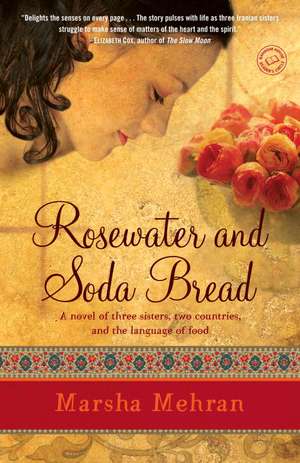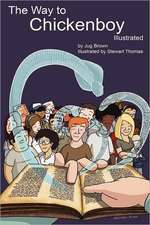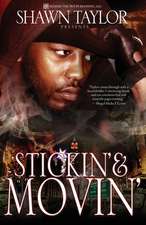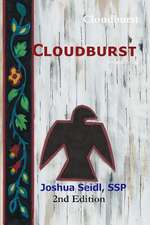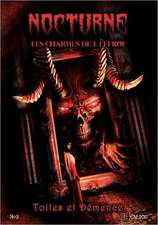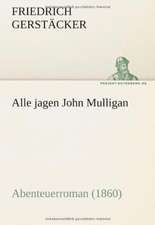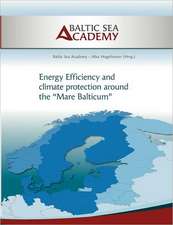Rosewater and Soda Bread
Autor Marsha Mehranen Limba Engleză Paperback – 16 mai 2008
–Elizabeth Cox, author of The Slow Moon
More than a year has passed since Marjan, Bahar, and Layla, the beautiful Iranian Aminpour sisters, sought refuge in the quaint Irish town of Ballinacroagh. Opening the beguiling Babylon Café, they charmed the locals with their warm hearts and delectable Persian cuisine, bringing a saffron-scented spice to the once-sleepy village.
But when a young woman with a dark secret literally washes up on Clew Bay Beach, the sisters’ world is once again turned upside down. With pale skin and webbed hands, the girl is otherworldly, but her wounds tell a more earthly (and graver) story–one that sends the strict Catholic town into an uproar. The Aminpours rally around the newcomer, but each sister must also contend with her own transformation–Marjan tests her feelings for love with a dashing writer, Bahar takes on a new spiritual commitment with the help of Father Mahoney, and Layla matures into a young woman when she and her boyfriend, Malachy, step up their hot and heavy relationship.
Filled with mouthwatering recipes and enchanting details of life in Ireland, Rosewater and Soda Bread is infused with a lyrical warmth that radiates from the Aminpour family and their big-hearted Italian landlady, Estelle, to the whole of Ballinacroagh–and the world beyond.
Praise for Marsha Mehran’s Pomegranate Soup
“A mouthwatering tale with flavors of Chocolat and Under the Tuscan Sun . . . sinfully sweet and satisfying.”
–Orlando Sentinel
“Glorious, daring, and delightful, filled with humor, hope, and possibility.”
–Adriana Trigiani, author of the Big Stone Gap novels
“An enchanting tale of love, family, and renewal.”
–Firoozeh Dumas, author of Laughing Without an Accent
Preț: 90.11 lei
Nou
Puncte Express: 135
Preț estimativ în valută:
17.25€ • 18.74$ • 14.50£
17.25€ • 18.74$ • 14.50£
Carte disponibilă
Livrare economică 31 martie-14 aprilie
Livrare express 15-21 martie pentru 27.85 lei
Preluare comenzi: 021 569.72.76
Specificații
ISBN-13: 9780812972498
ISBN-10: 081297249X
Pagini: 292
Dimensiuni: 131 x 202 x 17 mm
Greutate: 0.31 kg
Editura: Random House Trade
ISBN-10: 081297249X
Pagini: 292
Dimensiuni: 131 x 202 x 17 mm
Greutate: 0.31 kg
Editura: Random House Trade
Notă biografică
Born in Tehran, Iran, Marsha Mehran escaped the Revolution with her family. She has since lived in such diverse places as Buenos Aires, The United States, Australia and Ireland. Her first novel, Pomegranate Soup was an international bestseller. She lives in New York, where she is busy spinning more tales.
Extras
Much Ado About A Friar
MRS. DERVLA QUIGLEY, perpetual widow of James Ignatius Quigley, was the self-proclaimed arbiter of all that was decent and holy in the coastal village of Ballinacroagh.
By no sheer accident was her place of inhabitance situated over the Reek Relics shop, a musty amalgamation of crucifixes, laminated prayer cards, bottled holy water, and any paraphernalia pertaining to Saint Patrick. The dark apartment she shared with her spinster sister afforded Dervla a steady view of Main Mall, a crooked, cobbled main street that, despite all her efforts, had been greatly altered in the last year and a half.
There was a time, Dervla bitterly recalled, when a respectable citizen could sit by her bedroom window and not be battered by the smells of strange lands; a day when the only problem confronting decent folk was whether they should take an umbrella on the way out or brave unprotected the cold, pricking rain that plagued the western plains of Ireland eleven out of twelve months.
But then, that was before those three in that cafŽ came along.
Casting her rheumy eyes out onto Main Mall, Dervla settled her gaze on the squat stone building across the street. Its bright red door and purple shutters were closed, but it was nearly half past six in the morning, and as Dervla knew quite well by now, they would soon be opened for another day of business.
Another day of enduring the licentious smells of strange spices, the heady vapor of dishes that drew regular crowds of gluttons to the cafe’s windows and had prompted The Connaught Telegraph to declare it “County Mayo’s Best Kept Secret,” a title that still eluded Dervla’s caustic sensibilities.
“Divine” and “delicious” were how some had praised the food served behind that crimson door, but she was rather more inclined toward the sobering adjectives “debased” and “detrimental” to describe the goings-on of the Babylon Cafe.
During weekly meetings of Ballinacroagh’s Bible study group, held conveniently downstairs in the religious relics shop, Dervla Quigley was quick to remind her fellow members of the dangers of the Eastern-flavored eatery: “Let’s not forget who was behind Thomas McGuire’s tragic accident,” she would hiss, turning a portentous eye on the assembly of cobwebbed spinsters and whiskery matrons. “Drove the poor man to near ruin,” Dervla would say, referring to the colossal heart attack that had struck Thomas dead for a whole minute in the cafe.
As the proud proprietor of Ballinacroagh’s three smoky pubs, a title that also qualified him as its most successful businessman, Thomas McGuire had kept a tight rein on the village’s thin, and often precarious, economy. A workhorse of boundless stamina, he was rarely seen indulging in the drunken frivolities that passed as craic, or entertainment, in the small country town.
But for the heated caresses of his rotund wife, Cecilia, who enjoyed a nymphomania of epic proportions, Thomas had been a man devoted to the humorless world of stocktaking, profit margins, and the legalized peddling of Ireland’s favorite imbibed brew–thick, luscious stout. There were few who could have guessed, then, the fanciful desires that lurked in the bar owner’s congested heart.
Not even Dervla Quigley, Ballinacroagh’s most scrupulous rumormonger, had gathered that Thomas would have given up ownership of his three pubs, two spirit shops, and the Wilton Inn on Main Mall, for the chance to open his very own neon-faceted, disco-themed nightclub.
Thomas McGuire’s discotheque dream came to light one stormy afternoon, the weekend of the 1986 Patrician Day Dance.
The July festival, commemorating Saint Patrick’s spirited Lenten fast, also marked the fourth month since the Babylon Cafe had opened its bright red door for business. Stealing the awakened appetites of the Wilton Inn’s regular lunch crowd was reason enough for Thomas to unleash his mounting fury, but the fact that the cafe stood on the grounds where he had planned to open his long-awaited mirror-balled nightclub, Polyester Paddy’s, sparked what could only be regarded as a moment of certified insanity: he broke into the Babylon Cafe. There, inside its warm and quiet kitchen, he met his fate.
Bubbling away on the kitchen range, a vast green Aga stove that had lived through four wars (civil or otherwise) and a revolutionary uprising of patriots alike, was a pot of shimmering pomegranate soup. From its open lid escaped a perfume so erotic and tantalizing that, like the bewitching Salome, it revealed false prophets with every veiled motion. The sweet, languid smell of cooking pomegranates clasped itself around Thomas McGuire’s hardened heart and did not let go until it had smothered not only his stale breath but the decades of tyranny the drinks baron had imposed on Ballinacroagh’s unwitting inhabitants.
Though Thomas survived the heart attack, saved at the last minute by the cafe’s owners, he never returned to the run of his alcohol empire. The greater part of the publican’s days was now spent sitting in a lumpy chair; he resurfaced in public during Christmas and Easter Masses, a pale and withered doppelganger of his former self.
Yes, thought Dervla, things had definitely changed since those three foreign women moved into town.
Just then the red door across the street swung open. Dervla quickly disappeared behind her pastel chintz curtains, only to reemerge peeping a moment later. The oldest of the three, the one who made all the food, had just stepped out onto the damp sidewalk.
Dervla watched, following the dark-haired woman as she knelt to stop the cafe door open. The heavy door would shut easily were it not for the help of a stopper, which the woman was now securing at its corner. The doorstopper was none other than a crenellated iron, the same sort Dervla’s mother had used to wrinkle out her father’s Sunday poplin, heating it up on the turf stove that dominated their front parlor.
Those were the days, recalled the old gossip, when a woman knew her place in the world. No time idling in front of a pot of mash for her mother, no fiddling about with recipes and fancy trimmings, that’s for sure. She had more sensible chores to bother about. Sewing on buttons and picking fieldstones, now that was a woman’s true lot in life.
The woman, Marjan Something-or-Other, stood for a moment observing the iron stopper, then turned to face the Mall. Yawning, she took her time shrugging back her shoulders, shaking them loose with a smile. Her apron, a half-skirt bursting with pink and red roses, was tied loosely around her waist. She undid the bow at the back and retied it tighter, reaching in its deep front pocket for an elastic band. This she used to harness the mass of brown curls that would otherwise have fallen around her face.
Had it not been the modern year of 1987, thought Dervla, she would have sworn she had traveled back forty years in time, to when Estelle Delmonico had stood outside that very shop. Estelle would flash her thick hair and curvy bits on the street six mornings of the week, without a thought to decency or Jim Quigley’s roving eye.
That Italian witch had certainly caused a hullabaloo the year she moved into town, she and that mustachioed husband of hers. Opening up a bakery smack in the middle of Main Mall, peddling coffees and puffy pastries like it was some tinker’s wedding they were catering at. Not a loaf of brown bread or a potato farl to be seen in the entire shop. Imagine such a thing, now!
Dervla shook her head slowly, her tight gray perm anchoring any sudden toss. Her beady eyes followed the Marjan woman as she made her way to the cafe’s window shutters. Standing on the tips of her toes, she unlatched the bolts at either side of the wooden panels. Recently painted a deep plum color, the shutters folded back across the glass like a gentle accordion. As they did, a large bay window, framed by hanging baskets of wispy honeysuckle and Persian jasmine, revealed itself to the morning sun. The flowers in the baskets matched the dewy blossoms planted in two deep barrels directly below the ledge.
With a sideways tilt of her stooped back, a sloping spine that began in a pouchy, mole-infested neck, and her pointed chin angled just right, Dervla was able to look straight through, all the way to the back of the cafe’s dining room. There, on an elegant mahogany display counter, surrounded by teapots of various shapes and sizes, sat the showpiece of the Babylon Cafe, the machine she’d heard touted as “the greatest invention since the lightbulb.”
Bloody blasphemous, if you asked her, especially considering it had been Father Fergal Mahoney who had made that insidious claim, right in the middle of Saint Barnabas’s noontime Mass. That blasted contraption was the reason so many once-devoted parishioners rushed through their Sunday psalms nowadays, flying down Main Mall to that crimson door of hell with communion wafers still dissolving in their parched mouths. Shameful to the point of senseless, muttered Dervla. There ought to be a law against such behavior.
Suddenly, a soft light flickered inside the restaurant. Dervla watched as the Marjan woman switched on the last of the cafe’s five muted lamps, tapped the large belly of the gleaming machine with a silver spoon (a heathen ritual, no doubt), and positioned the diamond needle of an aging Victrola over an LP record. Cradling a short glass of tea in her palms, she walked back outside just as the sun broke through the cloudy sky.
MARJAN AMINPOUR SLOWLY sipped at her hot tea and studied the changing horizon. Mornings in Ireland were so different from those of her Persian childhood, she thought, not for the first time. Were she still in the land of her birth, Marjan mused, daybreak would be marked by the crisp sounds of a sofreh, the embroidered cloth upon which all meals were enjoyed, flapping over a richly carpeted floor. Once spread, the sofreh would be covered by jars of homemade preserves–rose petal, quincelime, and sour cherry–as well as pots of orange blossom honey and creamy butter. The jams and honey would sit alongside freshly baked rounds of sangak bread, golden and redolent with crunchy sesame seeds. Piled and teetering like a tower, the sangak was a perfect accompaniment to the platters of garden mint, sweet basil, and feta cheese placed on the sofreh, bought fresh from the local bazaar.
And of course, Marjan thought with a smile, no breakfast sofreh was complete without the presence of a steaming samovar, the golden water boiler without which fragrant cups of bergamot tea could not be enjoyed. No meal could survive without a stop of that draft.
Marjan sighed as she took another sip of her bergamot tea. She might not be in Iran now, but she could happily boast a pantry full of jam jars. Jam jars aplenty, to be precise, as well as a domed oven whose heated bricks turned dough into piping morsels of bread–not to mention a verdant back garden, where stalks of cilantro, mint, and feathery dill bloomed season after season. And while she didn’t have the time for an elaborate Persian breakfast, she did own a trusty electrical samovar, not to mention a view that had, throughout the centuries, mesmerized saints and sinners alike.
Marjan gazed up the steep and cobbled Main Mall, past the bright yellow frontage of Corcoran’s Bake Shop and the fat sausage displays of the Butcher’s Block, toward the obelisk monument at the opening of the town square. There, perched on his stone pedestal, with crooked staff in one hand and dead snakes splayed at his sandaled feet, was Patrick, patron saint of Eire. The old bishop looked rather triumphant in his regal robes, thought Marjan, free of the demons that had once haunted him. It had taken him a long time to get rid of them, but get rid of them he had.
From where she stood, Marjan could even see the rising summit of Croagh Patrick, County Mayo’s most illustrious mountain. Conical in shape and steeped in its usual misty blanket of green, “the Reek” was a popular destination for devout climbers, contrite pilgrims who hiked its shrouded peak in hopes of spiritual release.
In quiet moments, before her sisters had woken and when the only sound on the street was that of Conor Jennings’s Guinness truck, Marjan liked to take her morning tea with a view of the mountain. That old mound of penitence never ceased to amaze her, the modesty of its simple triangular shape filling her with peace and security.
Even the ancient Celts had felt the magic. Long before Saint Patrick had set foot on the mountain, druidic souls had ventured to its summit for worship. On days like today, thought Marjan, when the equinox was rounding its autumnal corner and the berries of surrounding hedgerows were turning from scarlet to deepest amethyst, their pagan exaltations must have been doubly poignant. Crops had been gathered, the old year was coming to an end, and winter was looming, dark and dangerous. Courage and faith had carried those early warriors through the bitterest of seasons. It was a great reminder of what could be done with a bit of luck, Marjan told herself.
Courage and faith–and a bit of Irish luck–had brought them to this little western town. It was still hard to believe that a year and a half had passed since she and her sisters had packed their bags and moved over from London. A year and a half! Marjan shook her head in awe. It seemed like only yesterday when she’d hung the wooden sign above the cafe door and begun serving platters of fried elephant ears and baklava to hungry villagers. She could still recall the anxiety with which she had prepared her first batch of dolmeh, the nerves that had threatened to get the better of her as she pushed the fragrant parcels into the hot oven. How she had prayed for strength on that spring day! Having planted her hopes deep inside for so long, she had willed them to burst forth, feeding her vision of a cafe filled with warmth, laughter, and light. And somehow things had worked out. Somehow they had found a home, here in this quiet corner of the world, this Ballinacroagh.
Amazing, thought Marjan with a smile, how some things turned out. There was much to be thankful for, that was for sure.
Nodding, she lifted the tea glass to her lips, drinking in the last of its orangey goodness. Taking one final look at the ancient mountain, she turned to go back into the cafe.
At the door she paused, lifting her fist to the small wooden shamrock nailed above the handle. The clover’s heart-shaped leaves were powerful shields against the evil eye, protecting all who paid it homage. It was a potent good luck charm that couldn’t hurt from some superstitious knocking, thought Marjan.
If nothing else, she told herself with a smile, her “heathen ways” would give Dervla Quigley something to nibble on for hours to come.
“WHERE WERE YOU?” Bahar said as Marjan walked into the kitchen with her empty glass. “I had to put the dried limes in myself,” she added, halfheartedly stirring a pot of herb stew with a wooden spoon.
Marjan gasped. “Did you just put them in?” She hurried to the Aga and grabbed the spoon from her sister. Four limoumani were bobbing happily amongst the stewing fenugreek. She deftly fished the limes out, placing them on a small terra-cotta saucer.
Bahar held up her hands. “Take it easy. It’s only a few limes,” she said, backing away from the green stove. Through the kitchen door she could see Fiona Athey and Evie Watson settling at their usual window-side seats. “Besides, aren’t you supposed to add the limoumani with the meat?”
“The meat has to soften with the herbs before you can introduce the sour. Otherwise, it’s too overpowering,” explained Marjan, waving her pinched thumb and forefinger in the air as though she were conducting a symphony. “You have to let the fenugreek take hold of the broth, you see,” she added.
Bahar sighed. “I don’t know how you remember all those details. Just hand me a knife and lead me to the chopping block. Anything else is too hard,” she said, tying an apron, one with maroon pheasants marching across the hem and pockets, around her neck and tiny waist. The apron was one of nearly a dozen their landlady and friend, Estelle Delmonico, had sewn for them that year.
“Looks like Fiona’s ready for her jasmine tea. I think we should just give her a permit to use the samovar whenever she wants. She’s in love with that thing!”
Marjan let out a laugh. “I know. I’m half-thinking of getting her one this Christmas. Mustafa’s sells them now.”
“Don’t you dare!” said Bahar, stuffing a frayed order pad into her apron pocket. “She’ll keep it in the salon, for sure. Then we’ll never see her.” She threw Marjan a creaky smile and swung past the kitchen doors.
Marjan returned to the pot and gave the thick herb stew another stir. The long, thin leaves of the fenugreek swam gracefully against the sides of her spoon, entwining themselves with the lighter cilantro, parsley, and chives.
According to the Persian seer Avicenna, whose Canon of Medicine Marjan often consulted, fenugreek is the first stop to curing winter chills. Combined with the hearty kidney beans and succulent meat of the herb stew, it made for an excellent garm, or hot, meal. Whenever she could, Marjan liked to adhere to the ancient Zoroastrian tradition of cooking, matching the needs and bounties of the season (as well as the individual eater) to ingredients.
“Ooooh! Gormeh sabzi! Can I take some to school?” Layla trundled down the stairs, skipping the last three steps with gymnastic flourish. She landed soundly on the woven runner that spanned the kitchen floor, her patchy knapsack bouncing off her back like a parachute in midflight.
Marjan placed the lid back on the stockpot and turned to her youngest sister. “It won’t be ready for another two hours. You’ll have to take some of yesterday’s saffron chicken instead.” She wiped her hands on a gingham tea towel and opened the cupboard door.
“Leftovers. God. Not again,” Layla groaned, pulling absently on her stockings. As was often the case, her school uniform was not the tidiest of numbers: a spidery rip ran down the ankle of one brown stocking, and her Doc Martens were scuffed on all sides. In accordance with school yard fashion, her striped blue shirt was not tucked in; it stuck out from the back of her dark regulation skirt, wrinkled and uneven.
Layla’s long black hair, Marjan was happy to note, was immaculate as ever. It gleamed within the folds of an intricate French braid, perfectly framing her creamy, oval face.
“I don’t know how I’m going to survive this year,” Layla complained. “At least when Emer was around I could trade lunches– she always had a bit of colcannon with her sandwiches.”
“You and your mashed potatoes,” Marjan remarked, lifting down a large mason jar of chickpea flour.
“Mmmm, I could eat colcannon every day,” said Layla, rubbing her stomach. She helped herself to a piece of lavash bread fresh from the brick oven. “Now it’s just me and Regina. And all she eats is prawn crisp rolls.”
Marjan grimaced. “That can’t be too healthy,” she said. She shook the enamel colander in her hand, sifting the flour into a large bowl. Thank heavens for Mustafa’s. Were it not for the Algerian specialty shop in Dublin, she’d have to ship the chickpea flour in from London. With the state of An Post, that could take months, whole seasons even, to get to Ballinacroagh.
“It’s not healthy. I don’t know how Regina stays so skinny,” Layla said, in between chews. “Must be all the farmwork she does after school.”
“Speaking of after school,” Bahar interjected, swinging in from the dining room, “can you please tell me once more why you need to personally pick Malachy up from the train station tomorrow? You can’t wait ten minutes before seeing your boyfriend again?”
“Here we go,” moaned Layla. “Miss Worrywart.” She plopped down at the round table in the corner and unzipped her knapsack.
Bahar continued, ignoring the barb, “You know you can’t drive the van without Marjan sitting next to you. I’m going to be left to fend for myself. At teatime no less,” she added testily.
“The weekends are my only time with Malachy, and I want to make the most of them. Besides, he hasn’t seen me with my L plates yet,” Layla replied absently, referring to her learner driver’s status. “I want to surprise him.”
She ruffled through the knapsack, retrieving a small leather-bound volume of Shakespeare’s Much Ado About Nothing, her favorite play. She opened the musty little book and breathed in its pulpy scent.
“You don’t see me complaining when you disappear every other afternoon.”
“My free time is none of your business,” retorted Bahar. She tore off Fiona and Evie’s order and pinned it to a silver carousel in the middle of the wooden island.
“Where do you go exactly on your breaks, anyway? Got some lover you’re not telling us about?” Layla winked at her sister, teasing her with a smile.
Bahar stared hard at her younger sister. She opened her mouth but closed it just as quickly again on second thought. With teeth clenched, she turned to the island and began to prepare a plate of rose petal jam and breads for the two hairdressers’ breakfast, her shoulders stiff with silent fury.
Layla exchanged looks with Marjan.
“Hey, I didn’t mean that, Bahar,” she began, softly. Bahar continued her buttering in silence. Layla bit her lip. “Bahar. Come on. We’re only going to be gone a few minutes.”
Bahar paused. She swiveled slowly on her heels, her left eyebrow arched high. “What, no necking on Clew Bay Beach?” Her lips twitched devilishly. “I expected more from you, Layla Aminpour!”
“Oh!” Layla grabbed the gingham towel and threw it across the kitchen at Bahar. “Cheeky!”
Marjan, who had been anticipating another row between her sisters, was happy to return to the harmony of her chickpea dough.
THE ANGELUS RANG on time as always, the bells in Saint Barnabas’s tower pealing the six o’clock hour. Evening, and time for rest.
Marjan wiped the island with a tea towel and placed a jug of golden chrysanthemums squarely in its center. She could hear the Victrola playing Billie Holiday in the front dining room, interspersed with the television upstairs. Layla must have been done with her homework. At least Marjan hoped that was the case.
She gave the kitchen one last look and sighed. It was still a mess. The piles of dishes left from teatime were waiting for a wash, and the brick oven had to be brushed of its ashes one more time. The countertops sparkled from her rosewater spray–a cleaning solution that smelled absolutely glorious–but the wooden floor planks were still grimy from the lunch and tea rush. Her shoes made sticky sounds as she crossed to the round table.
She had to resist taking the mop to the floor herself. Cleanup always belonged to Bahar, after all. It was her duty to see that there were plenty of dishes clean for every turnover throughout the day, and to make sure the floor and counters were spotless by the ringing of the six o’clock prayer bell. That was the arrangement. Without it, the cafŽ would soon turn into one chaotic mess. Bahar knew this.
In fact, she usually liked nothing better than a good scrubbing–and pruned hands to prove it–at the end of a long working day. For as long as Marjan could remember, her sister had been a stickler for getting things spick-and-span, even obsessive in her quest. She never had to be asked twice to take a sponge to a crumby counter.
At least, that was how Bahar used to react to mess.
It was a rare sight to see the kitchen clean by this time of evening nowadays. Their tidy system had been in flux ever since Bahar began taking her afternoon breaks. Often, Marjan found herself doing double duty during tea, fixing the orders Layla brought in to her while rushing to the sink to replenish their dwindling pile of clean dishes, all the while keeping an eye on the brick oven, which delivered constant rounds of bread and kebabs of chicken, mint lamb, and onion. It was getting to be very exhausting. When she had pointed this out to Bahar, her sister’s response had been tepid, offhanded even.
“I don’t expect you to understand,” Bahar had said with a quick shrug. “You’ve got the cafe and cooking and everything– this is what you’ve always wanted. But I’ll go crazy if I spend every single moment cooped up inside. I need my time as well.”
And so the advent of her afternoon breaks, taken every other weekday.
What she did on her time away, Marjan never asked. And Bahar wasn’t terribly forthcoming about it. The only indication that she had accomplished something of substance was the glow on her face when she returned an hour before closing.
It was strange to see her usually mercurial sister so calm, thought Marjan. It was enough to incite some worry.
She knew she should be thankful to have Bahar in such a light mood for the rest of the night, but she couldn’t help but ruminate, with some trepidation, on the cause behind her sister’s recent demeanor. It wasn’t the first time Bahar had been so secretive about a part of her life, after all.
Nine years ago she had changed from a normal enough teenager to a raging revolutionary in a matter of days. Wrapped in a chador, she had taken to the streets of Tehran, joining a pack of women who were protesting the reign of the Shah and his decades of tyranny. To some it may have seemed peculiar, this sudden change that had come over Bahar when she was only sixteen, but Marjan knew it was in accordance with her pendulum-like personality. Bahar had always had an unpredictable mixture of garm (hot) and sard (cold) coursing through her veins. Its wellspring could be found in the seasons of life itself, the day of the equinox and Bahar’s birthday as well, March 21. That was when new and old converged, creating an unpredictable nature in anyone born on that date.
Still, even Marjan had been shocked when Bahar announced her engagement to a man twice her age.
Marjan took a deep breath, determined not to let her worry get the best of her. Eager to focus on something other than her sister’s mysterious behavior, she grabbed a cup of bergamot tea and sat down at the round table to go over the menu for the next day.
It was one of the moments she most looked forward to, designing her schedule of treats. Planning and listing always cleared her mind of any stresses that had piled on her shoulders during the course of her working day. Cooking required a certain degree of compartmentalization, but it also involved a lot of variables, chaotic moments that were unscripted. With her lists, Marjan could be a lot more simple. Yet still adventurous.
Especially for this season: autumn called for a touch of nuance from every chef.
Marjan bit the end of her pen in thought. She’d stick to the gormeh sabzi she had made today: the two batches she had made were gone by one o’clock. But another garm dish was needed still, something warming, something like stuffed eggplants with turmeric-encrusted lamb. A poor man’s saffron to some, turmeric. But for Marjan, it had much more use than just its ability to give rice a yellowy hue. The spice, when cooked with dark meats, tended to unseen inflammations in the body, which, if left unheeded, could mark the beginnings of disease.
Gormeh sabzi, stuffed eggplants, and turmeric-encrusted lamb. Yes, she nodded, that would work out just grand.
And she’d have to make some more chickpea cookies as well. She would need a few rounds for the Bonfire the next evening.
As for a soup, she was thinking of a nice noodle with meat and rice dumplings–like the ones their mother used to make before the first frost descended over Tehran. It had been Marjan’s job to press the sides of the dumplings with a fork, securing them before they were plopped into the steamy, perfumed broth. What a joy it was to see them defy the heat, staying intact until they were in her hungry little mouth!
Marjan smiled softly to herself and scribbled away, sipping at her tea occasionally. She was down to her pastry list when Bahar swung through the kitchen doors, carrying a large mustard-colored teapot.
“Have you closed?” Marjan asked, without looking up.
Bahar shook her head. “There’s one more person left,” she said, a funny look on her face.
“At this hour?”
Bahar placed the pot in the sink and turned to her. “It’s some English guy. He says he wants to see you.”
“Me?”
“He said he wants to compliment the chef. I don’t know what he’s talking about. He only had a pot of tea and a cheese plate.”
Marjan followed Bahar out the kitchen doors and into the dining room. The man was standing by the time she reached his table, the smaller one near the paisley-draped window.
He held out his hand. “Ms. Aminpour?”
“Hello. How can I help you?” she asked, returning his handshake. “Was your lunch all right?” She glanced quickly at the remnants of the cheese plate, happy to see all the herbs and feta polished clean from the oval dish. He had been drinking a pot of lemon oolong tea, the perfume of which still lingered.
“It was just grand. I didn’t think there could be better summer savory outside Iran, but I see I was wrong.”
Marjan blinked and took another look at the stranger. Behind her, she could hear Bahar pause in her clearing of tables.
He was at least half a foot taller than she was, well over six feet. The window behind him framed his broad shoulders and straight blond hair, which grew just past his neck, meeting the collar of his tawny corduroy jacket. He had a strong jaw and a narrow nose, Marjan noticed, an easy smile playing on full lips.
“You’ve been to Iran?”
“Hasn’t everyone?” he said, a smile flashing across his face. “Actually, the last time I was there was in seventy-eight, right before the hostage crisis.”
“We had left by then as well.”
The man’s green eyes flickered with interest. “We?”
“My sisters and I,” Marjan said, surprised at the information she was letting loose even before knowing this stranger’s name. She turned to indicate Bahar behind her, but she had already disappeared into the kitchen. Marjan turned back to the stranger. “I’m sorry, what was your name?”
The Englishman reddened. “Oh, I do apologize. Julian Winthrop Muir. How do you do?” He shook her hand again. It was then that Marjan realized he had never let it go. He had a strong grip, she thought, noticing the golden hairs along his broad wrist.
“Marjan Aminpour,” she said, letting go of his hand.
“I know who you are,” said Julian. “I’ve read all about it in The Connaught Telegraph. ‘Mystic Marjan’s Recipe of Magic. Mayo’s Best Kept Secret.’ ” He swept his palm in the air between them, as though conjuring the heading as he spoke it. “ ‘Ireland’s Number One Exotic Destination.’ ”
Marjan blushed. “I think the Connaught was a bit biased. The editor eats here every Saturday.”
“And why wouldn’t he? Persian food’s the thing, isn’t it? ‘Two days between layers of baklava, in the quiet seclusion where souls sweeten.’ ”
Marjan was surprised. “You know Rumi?”
“Did my thesis on the Sufi poets back at Oxford,” Julian replied, shaking his head. “Decades ago now it seems.”
“So you are a poet?”
“Not in the least, I’m afraid. Though I make my way by writing. Novels, mostly.” He ran his hand through his hair, pushing it away from his face.
Marjan gave him another quick glance before moving toward his table. She began to stack the empty plates and tea glass on the platter, aware of his following gaze. “What have you written?” she asked, suddenly feeling strangely nervous. “Maybe I’ve read some of your work.”
“Oh, I doubt that. My stuff gets the critics but not readers, unfortunately.” He paused. “That’s why I’ve come back. To get away from all the nonsense.”
“So you’ve been to Mayo before?”
“Family was from here. Down Louisburgh way. I’m staying at the Wilton Inn at the moment. Just checked in today, in fact.” Julian smiled again. “But I most certainly will be having my meals here from now on.”
Marjan hoisted the platter on her arms. “Oh, I don’t know, I hear the carvery does a mighty roast plate. Peppercorn gravy, turnip mash, and all,” she said, her lips curving.
“But it doesn’t hold its own to that cherry rice I saw being served. A meal that’s taken its time to formulate. ‘Let the kettle boil slowly...’”
“ ‘For stew boiled in haste is of no use to anyone.’ ” Marjan smiled again, recalling the proverb immediately.
Julian nodded. “Exactly. Makes you wonder what would have happened if Marco Polo and the Silk Road had made it all the way to Ireland.”
“Potatoes would certainly have taken a hit,” replied Marjan, tickled by the thought.
“Might have even stopped the famine. Imagine that now: the Irish could have been clear of the English earlier but for that. Change the whole course of the nation with just a bowl of sweet cherry rice.”
Marjan laughed. “Somehow I can’t imagine Paddy’s offering chelow with their Guinness.”
“Well, you never–” started Julian. He paused and turned around: a loud crash had just come from the street behind him.
They both glanced out the window, in time to catch Evie Watson storm out of the hair salon with a pair of sharp-looking scissors.
“You gobshite!” she yelled, stomping up the cobbled sidewalk on the heels of Peter Donnelly, her beau and all-around sparring mate. “You bastard! Stop, you hear me! Stop right there, Peter Donnelly!”
For once, the young hooligan chose to listen to his girlfriend. He braked directly in front of the Reek Relics shop and turned to face Evie. From behind her store door, Antonia Nolan could be seen watching the battle while chewing on a Picnic chocolate bar, delighted by the display.
“Now, Evie,” Peter started.
The junior stylist stamped her foot. “Don’t feckin’ Evie me! I’ve given you the best year yet, and this is the return I get? You little bollocks! I could kill you!” The scissors sliced the air between them.
Peter sighed. “All I said was that a man in my position needs to be looking to the future.” He held up his hands to protect the burdens of his sex. “It’s called progress. Consolidation.”
“Consolidate my feckin’ arse! You’re a chancer, you are, Peter Donnelly. Just looking for a cheap shag, that’s it all right!” Evie took a step forward with the scissors snapping furiously.
Just when it looked as if she was about to mow through Peter’s wavy brown hair, the latter came back with what in retrospect was not his wittiest rejoinder: “By ‘shag’ I don’t suppose you’re offering a haircut, now. Eh, babes?”
Evie screamed. Her reedlike body seemed to reverberate with the pitchy sound, a parenthesis of exploding fury. Opting for a weapon greater than the toothed scissors, she plunged deep into her bib pocket and pulled out a bottle of pink solution.
Aware of his fate but unable to stop it, Peter could only cover his eyes as his head was set awash with the entire contents of a bottle of Panto Perm XLRate, the most powerful permanent solution this side of Eastern Europe. The junior stylist then turned and ran back inside Athey’s Shear Delight, wailing all the way.
Julian broke the tension: “ ‘Love is reckless, not reason,’ ” he said, quoting one of Rumi’s better known verses.
Marjan stared at a dripping Peter Donnelly, who despite his soaked exterior had retained his swaggering air. No reason about that at all, she told herself; love was reckless, there was no other word for it.
MRS. DERVLA QUIGLEY, perpetual widow of James Ignatius Quigley, was the self-proclaimed arbiter of all that was decent and holy in the coastal village of Ballinacroagh.
By no sheer accident was her place of inhabitance situated over the Reek Relics shop, a musty amalgamation of crucifixes, laminated prayer cards, bottled holy water, and any paraphernalia pertaining to Saint Patrick. The dark apartment she shared with her spinster sister afforded Dervla a steady view of Main Mall, a crooked, cobbled main street that, despite all her efforts, had been greatly altered in the last year and a half.
There was a time, Dervla bitterly recalled, when a respectable citizen could sit by her bedroom window and not be battered by the smells of strange lands; a day when the only problem confronting decent folk was whether they should take an umbrella on the way out or brave unprotected the cold, pricking rain that plagued the western plains of Ireland eleven out of twelve months.
But then, that was before those three in that cafŽ came along.
Casting her rheumy eyes out onto Main Mall, Dervla settled her gaze on the squat stone building across the street. Its bright red door and purple shutters were closed, but it was nearly half past six in the morning, and as Dervla knew quite well by now, they would soon be opened for another day of business.
Another day of enduring the licentious smells of strange spices, the heady vapor of dishes that drew regular crowds of gluttons to the cafe’s windows and had prompted The Connaught Telegraph to declare it “County Mayo’s Best Kept Secret,” a title that still eluded Dervla’s caustic sensibilities.
“Divine” and “delicious” were how some had praised the food served behind that crimson door, but she was rather more inclined toward the sobering adjectives “debased” and “detrimental” to describe the goings-on of the Babylon Cafe.
During weekly meetings of Ballinacroagh’s Bible study group, held conveniently downstairs in the religious relics shop, Dervla Quigley was quick to remind her fellow members of the dangers of the Eastern-flavored eatery: “Let’s not forget who was behind Thomas McGuire’s tragic accident,” she would hiss, turning a portentous eye on the assembly of cobwebbed spinsters and whiskery matrons. “Drove the poor man to near ruin,” Dervla would say, referring to the colossal heart attack that had struck Thomas dead for a whole minute in the cafe.
As the proud proprietor of Ballinacroagh’s three smoky pubs, a title that also qualified him as its most successful businessman, Thomas McGuire had kept a tight rein on the village’s thin, and often precarious, economy. A workhorse of boundless stamina, he was rarely seen indulging in the drunken frivolities that passed as craic, or entertainment, in the small country town.
But for the heated caresses of his rotund wife, Cecilia, who enjoyed a nymphomania of epic proportions, Thomas had been a man devoted to the humorless world of stocktaking, profit margins, and the legalized peddling of Ireland’s favorite imbibed brew–thick, luscious stout. There were few who could have guessed, then, the fanciful desires that lurked in the bar owner’s congested heart.
Not even Dervla Quigley, Ballinacroagh’s most scrupulous rumormonger, had gathered that Thomas would have given up ownership of his three pubs, two spirit shops, and the Wilton Inn on Main Mall, for the chance to open his very own neon-faceted, disco-themed nightclub.
Thomas McGuire’s discotheque dream came to light one stormy afternoon, the weekend of the 1986 Patrician Day Dance.
The July festival, commemorating Saint Patrick’s spirited Lenten fast, also marked the fourth month since the Babylon Cafe had opened its bright red door for business. Stealing the awakened appetites of the Wilton Inn’s regular lunch crowd was reason enough for Thomas to unleash his mounting fury, but the fact that the cafe stood on the grounds where he had planned to open his long-awaited mirror-balled nightclub, Polyester Paddy’s, sparked what could only be regarded as a moment of certified insanity: he broke into the Babylon Cafe. There, inside its warm and quiet kitchen, he met his fate.
Bubbling away on the kitchen range, a vast green Aga stove that had lived through four wars (civil or otherwise) and a revolutionary uprising of patriots alike, was a pot of shimmering pomegranate soup. From its open lid escaped a perfume so erotic and tantalizing that, like the bewitching Salome, it revealed false prophets with every veiled motion. The sweet, languid smell of cooking pomegranates clasped itself around Thomas McGuire’s hardened heart and did not let go until it had smothered not only his stale breath but the decades of tyranny the drinks baron had imposed on Ballinacroagh’s unwitting inhabitants.
Though Thomas survived the heart attack, saved at the last minute by the cafe’s owners, he never returned to the run of his alcohol empire. The greater part of the publican’s days was now spent sitting in a lumpy chair; he resurfaced in public during Christmas and Easter Masses, a pale and withered doppelganger of his former self.
Yes, thought Dervla, things had definitely changed since those three foreign women moved into town.
Just then the red door across the street swung open. Dervla quickly disappeared behind her pastel chintz curtains, only to reemerge peeping a moment later. The oldest of the three, the one who made all the food, had just stepped out onto the damp sidewalk.
Dervla watched, following the dark-haired woman as she knelt to stop the cafe door open. The heavy door would shut easily were it not for the help of a stopper, which the woman was now securing at its corner. The doorstopper was none other than a crenellated iron, the same sort Dervla’s mother had used to wrinkle out her father’s Sunday poplin, heating it up on the turf stove that dominated their front parlor.
Those were the days, recalled the old gossip, when a woman knew her place in the world. No time idling in front of a pot of mash for her mother, no fiddling about with recipes and fancy trimmings, that’s for sure. She had more sensible chores to bother about. Sewing on buttons and picking fieldstones, now that was a woman’s true lot in life.
The woman, Marjan Something-or-Other, stood for a moment observing the iron stopper, then turned to face the Mall. Yawning, she took her time shrugging back her shoulders, shaking them loose with a smile. Her apron, a half-skirt bursting with pink and red roses, was tied loosely around her waist. She undid the bow at the back and retied it tighter, reaching in its deep front pocket for an elastic band. This she used to harness the mass of brown curls that would otherwise have fallen around her face.
Had it not been the modern year of 1987, thought Dervla, she would have sworn she had traveled back forty years in time, to when Estelle Delmonico had stood outside that very shop. Estelle would flash her thick hair and curvy bits on the street six mornings of the week, without a thought to decency or Jim Quigley’s roving eye.
That Italian witch had certainly caused a hullabaloo the year she moved into town, she and that mustachioed husband of hers. Opening up a bakery smack in the middle of Main Mall, peddling coffees and puffy pastries like it was some tinker’s wedding they were catering at. Not a loaf of brown bread or a potato farl to be seen in the entire shop. Imagine such a thing, now!
Dervla shook her head slowly, her tight gray perm anchoring any sudden toss. Her beady eyes followed the Marjan woman as she made her way to the cafe’s window shutters. Standing on the tips of her toes, she unlatched the bolts at either side of the wooden panels. Recently painted a deep plum color, the shutters folded back across the glass like a gentle accordion. As they did, a large bay window, framed by hanging baskets of wispy honeysuckle and Persian jasmine, revealed itself to the morning sun. The flowers in the baskets matched the dewy blossoms planted in two deep barrels directly below the ledge.
With a sideways tilt of her stooped back, a sloping spine that began in a pouchy, mole-infested neck, and her pointed chin angled just right, Dervla was able to look straight through, all the way to the back of the cafe’s dining room. There, on an elegant mahogany display counter, surrounded by teapots of various shapes and sizes, sat the showpiece of the Babylon Cafe, the machine she’d heard touted as “the greatest invention since the lightbulb.”
Bloody blasphemous, if you asked her, especially considering it had been Father Fergal Mahoney who had made that insidious claim, right in the middle of Saint Barnabas’s noontime Mass. That blasted contraption was the reason so many once-devoted parishioners rushed through their Sunday psalms nowadays, flying down Main Mall to that crimson door of hell with communion wafers still dissolving in their parched mouths. Shameful to the point of senseless, muttered Dervla. There ought to be a law against such behavior.
Suddenly, a soft light flickered inside the restaurant. Dervla watched as the Marjan woman switched on the last of the cafe’s five muted lamps, tapped the large belly of the gleaming machine with a silver spoon (a heathen ritual, no doubt), and positioned the diamond needle of an aging Victrola over an LP record. Cradling a short glass of tea in her palms, she walked back outside just as the sun broke through the cloudy sky.
MARJAN AMINPOUR SLOWLY sipped at her hot tea and studied the changing horizon. Mornings in Ireland were so different from those of her Persian childhood, she thought, not for the first time. Were she still in the land of her birth, Marjan mused, daybreak would be marked by the crisp sounds of a sofreh, the embroidered cloth upon which all meals were enjoyed, flapping over a richly carpeted floor. Once spread, the sofreh would be covered by jars of homemade preserves–rose petal, quincelime, and sour cherry–as well as pots of orange blossom honey and creamy butter. The jams and honey would sit alongside freshly baked rounds of sangak bread, golden and redolent with crunchy sesame seeds. Piled and teetering like a tower, the sangak was a perfect accompaniment to the platters of garden mint, sweet basil, and feta cheese placed on the sofreh, bought fresh from the local bazaar.
And of course, Marjan thought with a smile, no breakfast sofreh was complete without the presence of a steaming samovar, the golden water boiler without which fragrant cups of bergamot tea could not be enjoyed. No meal could survive without a stop of that draft.
Marjan sighed as she took another sip of her bergamot tea. She might not be in Iran now, but she could happily boast a pantry full of jam jars. Jam jars aplenty, to be precise, as well as a domed oven whose heated bricks turned dough into piping morsels of bread–not to mention a verdant back garden, where stalks of cilantro, mint, and feathery dill bloomed season after season. And while she didn’t have the time for an elaborate Persian breakfast, she did own a trusty electrical samovar, not to mention a view that had, throughout the centuries, mesmerized saints and sinners alike.
Marjan gazed up the steep and cobbled Main Mall, past the bright yellow frontage of Corcoran’s Bake Shop and the fat sausage displays of the Butcher’s Block, toward the obelisk monument at the opening of the town square. There, perched on his stone pedestal, with crooked staff in one hand and dead snakes splayed at his sandaled feet, was Patrick, patron saint of Eire. The old bishop looked rather triumphant in his regal robes, thought Marjan, free of the demons that had once haunted him. It had taken him a long time to get rid of them, but get rid of them he had.
From where she stood, Marjan could even see the rising summit of Croagh Patrick, County Mayo’s most illustrious mountain. Conical in shape and steeped in its usual misty blanket of green, “the Reek” was a popular destination for devout climbers, contrite pilgrims who hiked its shrouded peak in hopes of spiritual release.
In quiet moments, before her sisters had woken and when the only sound on the street was that of Conor Jennings’s Guinness truck, Marjan liked to take her morning tea with a view of the mountain. That old mound of penitence never ceased to amaze her, the modesty of its simple triangular shape filling her with peace and security.
Even the ancient Celts had felt the magic. Long before Saint Patrick had set foot on the mountain, druidic souls had ventured to its summit for worship. On days like today, thought Marjan, when the equinox was rounding its autumnal corner and the berries of surrounding hedgerows were turning from scarlet to deepest amethyst, their pagan exaltations must have been doubly poignant. Crops had been gathered, the old year was coming to an end, and winter was looming, dark and dangerous. Courage and faith had carried those early warriors through the bitterest of seasons. It was a great reminder of what could be done with a bit of luck, Marjan told herself.
Courage and faith–and a bit of Irish luck–had brought them to this little western town. It was still hard to believe that a year and a half had passed since she and her sisters had packed their bags and moved over from London. A year and a half! Marjan shook her head in awe. It seemed like only yesterday when she’d hung the wooden sign above the cafe door and begun serving platters of fried elephant ears and baklava to hungry villagers. She could still recall the anxiety with which she had prepared her first batch of dolmeh, the nerves that had threatened to get the better of her as she pushed the fragrant parcels into the hot oven. How she had prayed for strength on that spring day! Having planted her hopes deep inside for so long, she had willed them to burst forth, feeding her vision of a cafe filled with warmth, laughter, and light. And somehow things had worked out. Somehow they had found a home, here in this quiet corner of the world, this Ballinacroagh.
Amazing, thought Marjan with a smile, how some things turned out. There was much to be thankful for, that was for sure.
Nodding, she lifted the tea glass to her lips, drinking in the last of its orangey goodness. Taking one final look at the ancient mountain, she turned to go back into the cafe.
At the door she paused, lifting her fist to the small wooden shamrock nailed above the handle. The clover’s heart-shaped leaves were powerful shields against the evil eye, protecting all who paid it homage. It was a potent good luck charm that couldn’t hurt from some superstitious knocking, thought Marjan.
If nothing else, she told herself with a smile, her “heathen ways” would give Dervla Quigley something to nibble on for hours to come.
“WHERE WERE YOU?” Bahar said as Marjan walked into the kitchen with her empty glass. “I had to put the dried limes in myself,” she added, halfheartedly stirring a pot of herb stew with a wooden spoon.
Marjan gasped. “Did you just put them in?” She hurried to the Aga and grabbed the spoon from her sister. Four limoumani were bobbing happily amongst the stewing fenugreek. She deftly fished the limes out, placing them on a small terra-cotta saucer.
Bahar held up her hands. “Take it easy. It’s only a few limes,” she said, backing away from the green stove. Through the kitchen door she could see Fiona Athey and Evie Watson settling at their usual window-side seats. “Besides, aren’t you supposed to add the limoumani with the meat?”
“The meat has to soften with the herbs before you can introduce the sour. Otherwise, it’s too overpowering,” explained Marjan, waving her pinched thumb and forefinger in the air as though she were conducting a symphony. “You have to let the fenugreek take hold of the broth, you see,” she added.
Bahar sighed. “I don’t know how you remember all those details. Just hand me a knife and lead me to the chopping block. Anything else is too hard,” she said, tying an apron, one with maroon pheasants marching across the hem and pockets, around her neck and tiny waist. The apron was one of nearly a dozen their landlady and friend, Estelle Delmonico, had sewn for them that year.
“Looks like Fiona’s ready for her jasmine tea. I think we should just give her a permit to use the samovar whenever she wants. She’s in love with that thing!”
Marjan let out a laugh. “I know. I’m half-thinking of getting her one this Christmas. Mustafa’s sells them now.”
“Don’t you dare!” said Bahar, stuffing a frayed order pad into her apron pocket. “She’ll keep it in the salon, for sure. Then we’ll never see her.” She threw Marjan a creaky smile and swung past the kitchen doors.
Marjan returned to the pot and gave the thick herb stew another stir. The long, thin leaves of the fenugreek swam gracefully against the sides of her spoon, entwining themselves with the lighter cilantro, parsley, and chives.
According to the Persian seer Avicenna, whose Canon of Medicine Marjan often consulted, fenugreek is the first stop to curing winter chills. Combined with the hearty kidney beans and succulent meat of the herb stew, it made for an excellent garm, or hot, meal. Whenever she could, Marjan liked to adhere to the ancient Zoroastrian tradition of cooking, matching the needs and bounties of the season (as well as the individual eater) to ingredients.
“Ooooh! Gormeh sabzi! Can I take some to school?” Layla trundled down the stairs, skipping the last three steps with gymnastic flourish. She landed soundly on the woven runner that spanned the kitchen floor, her patchy knapsack bouncing off her back like a parachute in midflight.
Marjan placed the lid back on the stockpot and turned to her youngest sister. “It won’t be ready for another two hours. You’ll have to take some of yesterday’s saffron chicken instead.” She wiped her hands on a gingham tea towel and opened the cupboard door.
“Leftovers. God. Not again,” Layla groaned, pulling absently on her stockings. As was often the case, her school uniform was not the tidiest of numbers: a spidery rip ran down the ankle of one brown stocking, and her Doc Martens were scuffed on all sides. In accordance with school yard fashion, her striped blue shirt was not tucked in; it stuck out from the back of her dark regulation skirt, wrinkled and uneven.
Layla’s long black hair, Marjan was happy to note, was immaculate as ever. It gleamed within the folds of an intricate French braid, perfectly framing her creamy, oval face.
“I don’t know how I’m going to survive this year,” Layla complained. “At least when Emer was around I could trade lunches– she always had a bit of colcannon with her sandwiches.”
“You and your mashed potatoes,” Marjan remarked, lifting down a large mason jar of chickpea flour.
“Mmmm, I could eat colcannon every day,” said Layla, rubbing her stomach. She helped herself to a piece of lavash bread fresh from the brick oven. “Now it’s just me and Regina. And all she eats is prawn crisp rolls.”
Marjan grimaced. “That can’t be too healthy,” she said. She shook the enamel colander in her hand, sifting the flour into a large bowl. Thank heavens for Mustafa’s. Were it not for the Algerian specialty shop in Dublin, she’d have to ship the chickpea flour in from London. With the state of An Post, that could take months, whole seasons even, to get to Ballinacroagh.
“It’s not healthy. I don’t know how Regina stays so skinny,” Layla said, in between chews. “Must be all the farmwork she does after school.”
“Speaking of after school,” Bahar interjected, swinging in from the dining room, “can you please tell me once more why you need to personally pick Malachy up from the train station tomorrow? You can’t wait ten minutes before seeing your boyfriend again?”
“Here we go,” moaned Layla. “Miss Worrywart.” She plopped down at the round table in the corner and unzipped her knapsack.
Bahar continued, ignoring the barb, “You know you can’t drive the van without Marjan sitting next to you. I’m going to be left to fend for myself. At teatime no less,” she added testily.
“The weekends are my only time with Malachy, and I want to make the most of them. Besides, he hasn’t seen me with my L plates yet,” Layla replied absently, referring to her learner driver’s status. “I want to surprise him.”
She ruffled through the knapsack, retrieving a small leather-bound volume of Shakespeare’s Much Ado About Nothing, her favorite play. She opened the musty little book and breathed in its pulpy scent.
“You don’t see me complaining when you disappear every other afternoon.”
“My free time is none of your business,” retorted Bahar. She tore off Fiona and Evie’s order and pinned it to a silver carousel in the middle of the wooden island.
“Where do you go exactly on your breaks, anyway? Got some lover you’re not telling us about?” Layla winked at her sister, teasing her with a smile.
Bahar stared hard at her younger sister. She opened her mouth but closed it just as quickly again on second thought. With teeth clenched, she turned to the island and began to prepare a plate of rose petal jam and breads for the two hairdressers’ breakfast, her shoulders stiff with silent fury.
Layla exchanged looks with Marjan.
“Hey, I didn’t mean that, Bahar,” she began, softly. Bahar continued her buttering in silence. Layla bit her lip. “Bahar. Come on. We’re only going to be gone a few minutes.”
Bahar paused. She swiveled slowly on her heels, her left eyebrow arched high. “What, no necking on Clew Bay Beach?” Her lips twitched devilishly. “I expected more from you, Layla Aminpour!”
“Oh!” Layla grabbed the gingham towel and threw it across the kitchen at Bahar. “Cheeky!”
Marjan, who had been anticipating another row between her sisters, was happy to return to the harmony of her chickpea dough.
THE ANGELUS RANG on time as always, the bells in Saint Barnabas’s tower pealing the six o’clock hour. Evening, and time for rest.
Marjan wiped the island with a tea towel and placed a jug of golden chrysanthemums squarely in its center. She could hear the Victrola playing Billie Holiday in the front dining room, interspersed with the television upstairs. Layla must have been done with her homework. At least Marjan hoped that was the case.
She gave the kitchen one last look and sighed. It was still a mess. The piles of dishes left from teatime were waiting for a wash, and the brick oven had to be brushed of its ashes one more time. The countertops sparkled from her rosewater spray–a cleaning solution that smelled absolutely glorious–but the wooden floor planks were still grimy from the lunch and tea rush. Her shoes made sticky sounds as she crossed to the round table.
She had to resist taking the mop to the floor herself. Cleanup always belonged to Bahar, after all. It was her duty to see that there were plenty of dishes clean for every turnover throughout the day, and to make sure the floor and counters were spotless by the ringing of the six o’clock prayer bell. That was the arrangement. Without it, the cafŽ would soon turn into one chaotic mess. Bahar knew this.
In fact, she usually liked nothing better than a good scrubbing–and pruned hands to prove it–at the end of a long working day. For as long as Marjan could remember, her sister had been a stickler for getting things spick-and-span, even obsessive in her quest. She never had to be asked twice to take a sponge to a crumby counter.
At least, that was how Bahar used to react to mess.
It was a rare sight to see the kitchen clean by this time of evening nowadays. Their tidy system had been in flux ever since Bahar began taking her afternoon breaks. Often, Marjan found herself doing double duty during tea, fixing the orders Layla brought in to her while rushing to the sink to replenish their dwindling pile of clean dishes, all the while keeping an eye on the brick oven, which delivered constant rounds of bread and kebabs of chicken, mint lamb, and onion. It was getting to be very exhausting. When she had pointed this out to Bahar, her sister’s response had been tepid, offhanded even.
“I don’t expect you to understand,” Bahar had said with a quick shrug. “You’ve got the cafe and cooking and everything– this is what you’ve always wanted. But I’ll go crazy if I spend every single moment cooped up inside. I need my time as well.”
And so the advent of her afternoon breaks, taken every other weekday.
What she did on her time away, Marjan never asked. And Bahar wasn’t terribly forthcoming about it. The only indication that she had accomplished something of substance was the glow on her face when she returned an hour before closing.
It was strange to see her usually mercurial sister so calm, thought Marjan. It was enough to incite some worry.
She knew she should be thankful to have Bahar in such a light mood for the rest of the night, but she couldn’t help but ruminate, with some trepidation, on the cause behind her sister’s recent demeanor. It wasn’t the first time Bahar had been so secretive about a part of her life, after all.
Nine years ago she had changed from a normal enough teenager to a raging revolutionary in a matter of days. Wrapped in a chador, she had taken to the streets of Tehran, joining a pack of women who were protesting the reign of the Shah and his decades of tyranny. To some it may have seemed peculiar, this sudden change that had come over Bahar when she was only sixteen, but Marjan knew it was in accordance with her pendulum-like personality. Bahar had always had an unpredictable mixture of garm (hot) and sard (cold) coursing through her veins. Its wellspring could be found in the seasons of life itself, the day of the equinox and Bahar’s birthday as well, March 21. That was when new and old converged, creating an unpredictable nature in anyone born on that date.
Still, even Marjan had been shocked when Bahar announced her engagement to a man twice her age.
Marjan took a deep breath, determined not to let her worry get the best of her. Eager to focus on something other than her sister’s mysterious behavior, she grabbed a cup of bergamot tea and sat down at the round table to go over the menu for the next day.
It was one of the moments she most looked forward to, designing her schedule of treats. Planning and listing always cleared her mind of any stresses that had piled on her shoulders during the course of her working day. Cooking required a certain degree of compartmentalization, but it also involved a lot of variables, chaotic moments that were unscripted. With her lists, Marjan could be a lot more simple. Yet still adventurous.
Especially for this season: autumn called for a touch of nuance from every chef.
Marjan bit the end of her pen in thought. She’d stick to the gormeh sabzi she had made today: the two batches she had made were gone by one o’clock. But another garm dish was needed still, something warming, something like stuffed eggplants with turmeric-encrusted lamb. A poor man’s saffron to some, turmeric. But for Marjan, it had much more use than just its ability to give rice a yellowy hue. The spice, when cooked with dark meats, tended to unseen inflammations in the body, which, if left unheeded, could mark the beginnings of disease.
Gormeh sabzi, stuffed eggplants, and turmeric-encrusted lamb. Yes, she nodded, that would work out just grand.
And she’d have to make some more chickpea cookies as well. She would need a few rounds for the Bonfire the next evening.
As for a soup, she was thinking of a nice noodle with meat and rice dumplings–like the ones their mother used to make before the first frost descended over Tehran. It had been Marjan’s job to press the sides of the dumplings with a fork, securing them before they were plopped into the steamy, perfumed broth. What a joy it was to see them defy the heat, staying intact until they were in her hungry little mouth!
Marjan smiled softly to herself and scribbled away, sipping at her tea occasionally. She was down to her pastry list when Bahar swung through the kitchen doors, carrying a large mustard-colored teapot.
“Have you closed?” Marjan asked, without looking up.
Bahar shook her head. “There’s one more person left,” she said, a funny look on her face.
“At this hour?”
Bahar placed the pot in the sink and turned to her. “It’s some English guy. He says he wants to see you.”
“Me?”
“He said he wants to compliment the chef. I don’t know what he’s talking about. He only had a pot of tea and a cheese plate.”
Marjan followed Bahar out the kitchen doors and into the dining room. The man was standing by the time she reached his table, the smaller one near the paisley-draped window.
He held out his hand. “Ms. Aminpour?”
“Hello. How can I help you?” she asked, returning his handshake. “Was your lunch all right?” She glanced quickly at the remnants of the cheese plate, happy to see all the herbs and feta polished clean from the oval dish. He had been drinking a pot of lemon oolong tea, the perfume of which still lingered.
“It was just grand. I didn’t think there could be better summer savory outside Iran, but I see I was wrong.”
Marjan blinked and took another look at the stranger. Behind her, she could hear Bahar pause in her clearing of tables.
He was at least half a foot taller than she was, well over six feet. The window behind him framed his broad shoulders and straight blond hair, which grew just past his neck, meeting the collar of his tawny corduroy jacket. He had a strong jaw and a narrow nose, Marjan noticed, an easy smile playing on full lips.
“You’ve been to Iran?”
“Hasn’t everyone?” he said, a smile flashing across his face. “Actually, the last time I was there was in seventy-eight, right before the hostage crisis.”
“We had left by then as well.”
The man’s green eyes flickered with interest. “We?”
“My sisters and I,” Marjan said, surprised at the information she was letting loose even before knowing this stranger’s name. She turned to indicate Bahar behind her, but she had already disappeared into the kitchen. Marjan turned back to the stranger. “I’m sorry, what was your name?”
The Englishman reddened. “Oh, I do apologize. Julian Winthrop Muir. How do you do?” He shook her hand again. It was then that Marjan realized he had never let it go. He had a strong grip, she thought, noticing the golden hairs along his broad wrist.
“Marjan Aminpour,” she said, letting go of his hand.
“I know who you are,” said Julian. “I’ve read all about it in The Connaught Telegraph. ‘Mystic Marjan’s Recipe of Magic. Mayo’s Best Kept Secret.’ ” He swept his palm in the air between them, as though conjuring the heading as he spoke it. “ ‘Ireland’s Number One Exotic Destination.’ ”
Marjan blushed. “I think the Connaught was a bit biased. The editor eats here every Saturday.”
“And why wouldn’t he? Persian food’s the thing, isn’t it? ‘Two days between layers of baklava, in the quiet seclusion where souls sweeten.’ ”
Marjan was surprised. “You know Rumi?”
“Did my thesis on the Sufi poets back at Oxford,” Julian replied, shaking his head. “Decades ago now it seems.”
“So you are a poet?”
“Not in the least, I’m afraid. Though I make my way by writing. Novels, mostly.” He ran his hand through his hair, pushing it away from his face.
Marjan gave him another quick glance before moving toward his table. She began to stack the empty plates and tea glass on the platter, aware of his following gaze. “What have you written?” she asked, suddenly feeling strangely nervous. “Maybe I’ve read some of your work.”
“Oh, I doubt that. My stuff gets the critics but not readers, unfortunately.” He paused. “That’s why I’ve come back. To get away from all the nonsense.”
“So you’ve been to Mayo before?”
“Family was from here. Down Louisburgh way. I’m staying at the Wilton Inn at the moment. Just checked in today, in fact.” Julian smiled again. “But I most certainly will be having my meals here from now on.”
Marjan hoisted the platter on her arms. “Oh, I don’t know, I hear the carvery does a mighty roast plate. Peppercorn gravy, turnip mash, and all,” she said, her lips curving.
“But it doesn’t hold its own to that cherry rice I saw being served. A meal that’s taken its time to formulate. ‘Let the kettle boil slowly...’”
“ ‘For stew boiled in haste is of no use to anyone.’ ” Marjan smiled again, recalling the proverb immediately.
Julian nodded. “Exactly. Makes you wonder what would have happened if Marco Polo and the Silk Road had made it all the way to Ireland.”
“Potatoes would certainly have taken a hit,” replied Marjan, tickled by the thought.
“Might have even stopped the famine. Imagine that now: the Irish could have been clear of the English earlier but for that. Change the whole course of the nation with just a bowl of sweet cherry rice.”
Marjan laughed. “Somehow I can’t imagine Paddy’s offering chelow with their Guinness.”
“Well, you never–” started Julian. He paused and turned around: a loud crash had just come from the street behind him.
They both glanced out the window, in time to catch Evie Watson storm out of the hair salon with a pair of sharp-looking scissors.
“You gobshite!” she yelled, stomping up the cobbled sidewalk on the heels of Peter Donnelly, her beau and all-around sparring mate. “You bastard! Stop, you hear me! Stop right there, Peter Donnelly!”
For once, the young hooligan chose to listen to his girlfriend. He braked directly in front of the Reek Relics shop and turned to face Evie. From behind her store door, Antonia Nolan could be seen watching the battle while chewing on a Picnic chocolate bar, delighted by the display.
“Now, Evie,” Peter started.
The junior stylist stamped her foot. “Don’t feckin’ Evie me! I’ve given you the best year yet, and this is the return I get? You little bollocks! I could kill you!” The scissors sliced the air between them.
Peter sighed. “All I said was that a man in my position needs to be looking to the future.” He held up his hands to protect the burdens of his sex. “It’s called progress. Consolidation.”
“Consolidate my feckin’ arse! You’re a chancer, you are, Peter Donnelly. Just looking for a cheap shag, that’s it all right!” Evie took a step forward with the scissors snapping furiously.
Just when it looked as if she was about to mow through Peter’s wavy brown hair, the latter came back with what in retrospect was not his wittiest rejoinder: “By ‘shag’ I don’t suppose you’re offering a haircut, now. Eh, babes?”
Evie screamed. Her reedlike body seemed to reverberate with the pitchy sound, a parenthesis of exploding fury. Opting for a weapon greater than the toothed scissors, she plunged deep into her bib pocket and pulled out a bottle of pink solution.
Aware of his fate but unable to stop it, Peter could only cover his eyes as his head was set awash with the entire contents of a bottle of Panto Perm XLRate, the most powerful permanent solution this side of Eastern Europe. The junior stylist then turned and ran back inside Athey’s Shear Delight, wailing all the way.
Julian broke the tension: “ ‘Love is reckless, not reason,’ ” he said, quoting one of Rumi’s better known verses.
Marjan stared at a dripping Peter Donnelly, who despite his soaked exterior had retained his swaggering air. No reason about that at all, she told herself; love was reckless, there was no other word for it.
Descriere
This delightful novel from the international bestselling author of "Pomegranate Soup" follows the heartwarming adventures of three Iranian sisters who own a caf brimming with delicacies and conversation in small-town Ireland.
